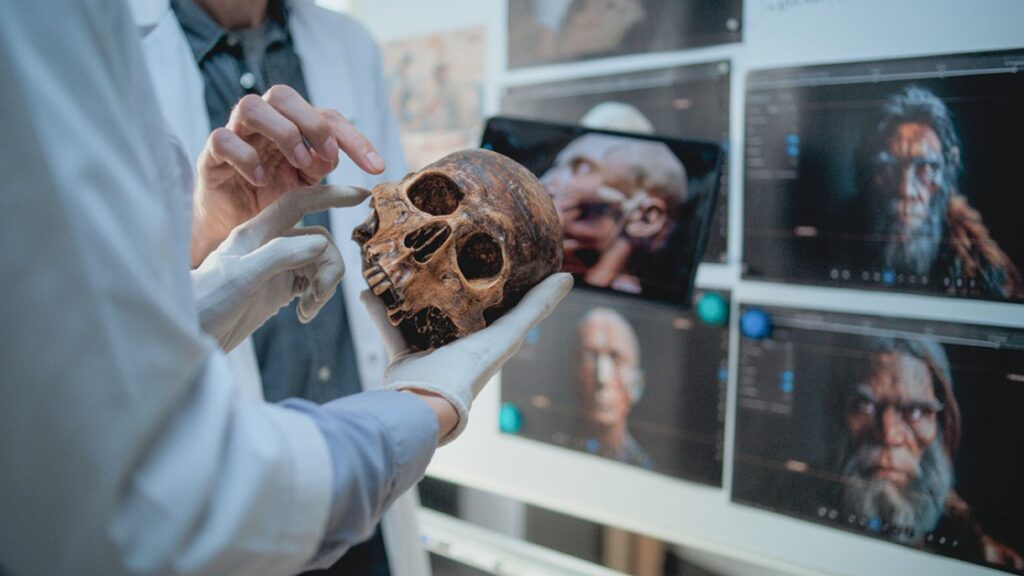
PROVIDENCE, R.I. — A groundbreaking study from Brown University reveals that ancient interbreeding with Denisovans, an archaic human species, provided modern humans with a genetic variant that may have aided their adaptation to new environments. This discovery sheds light on how ancient genes continue to influence human survival today.
The research, published in the journal Science, centers on the MUC19 gene, which plays a role in producing proteins that form saliva and mucosal barriers in the respiratory and digestive tracts. The study indicates that a variant of this gene, inherited from Denisovans, is present in modern Latin Americans with Indigenous American ancestry. Furthermore, it was found in DNA samples from archaeological sites across North and South America.
Denisovan Legacy in Modern Populations
The presence of the Denisovan-derived MUC19 gene in contemporary human populations suggests it was subject to significant natural selection, offering a survival or reproductive advantage to its carriers. While the precise advantage remains unclear, the gene’s involvement in immune processes suggests it may have helped ancient populations combat pathogens encountered during their migration into the Americas thousands of years ago.
“From an evolutionary standpoint, this finding shows how ancient interbreeding can have effects that we still see today,” said Emilia Huerta-Sánchez, a professor at Brown University and study author. “From a biological standpoint, we identify a gene that appears to be adaptive, but whose function hasn’t yet been characterized. We hope that leads to additional study of what this gene is actually doing.”
Unraveling the Denisovan Mystery
Despite limited physical evidence of Denisovans, who lived in Asia between 300,000 and 30,000 years ago, their genetic legacy persists. Known fossils include small remains from Denisova Cave in Siberia, jawbones from Tibet and Taiwan, and a recently discovered skull in China. A finger fossil from Siberia provided ancient DNA, enabling scientists to trace common genes between Denisovans and modern humans.
Previous research led by Huerta-Sánchez identified another Denisovan gene, EPAS1, which may have helped Sherpas and Tibetans adapt to high altitudes. This study expands on that work, comparing Denisovan DNA with modern genomes from the 1,000 Genomes Project, a global survey of genetic variation.
Implications of Genetic Interbreeding
The study found that the Denisovan-derived MUC19 gene is prevalent in Latino populations with Indigenous American ancestry. It was also detected in DNA from 23 individuals excavated from archaeological sites in Alaska, California, Mexico, and other parts of the Americas. The gene’s high frequency in these ancient individuals suggests it was favored by natural selection.
Researchers used independent statistical tests to confirm that the Denisovan MUC19 gene variant rose to high frequencies in ancient Indigenous American populations and present-day people of Indigenous descent. The gene’s location on a long stretch of archaic DNA further supports the theory of natural selection enhancing its prevalence.
“Typically, genetic novelty is generated through a very slow process,” Huerta-Sánchez explained. “But these interbreeding events were a sudden way to introduce a lot of new variation.”
In this case, the “new reservoir of genetic variation” appears to have bolstered the immune system of migrating humans, aiding their survival in the Americas. “Something about this gene was clearly useful for these populations—and maybe still is or will be in the future,” Huerta-Sánchez noted.
Future Research and Biological Insights
The recognition of the gene’s significance is expected to spur further research into its function, potentially unveiling novel biological mechanisms. This is particularly relevant as the gene involves coding genetic variants that alter protein sequences.
Huerta-Sánchez collaborated with Fernando Villanea, a former postdoctoral researcher at Brown now at the University of Colorado, Boulder; David Peede, a Brown graduate student; and an international team of collaborators. The research received support from the Leakey Foundation, the National Institutes of Health, the Alfred P. Sloan Foundation, the Blavatnik Family Graduate Fellowship in Biology and Medicine, the Brown University Predoctoral Training Program in Biological Data Science, the Burroughs Wellcome Fund, and the Human Frontier Science Program.
The study not only highlights the enduring impact of Denisovan genes on modern human populations but also underscores the broader significance of ancient interbreeding events in shaping human evolution and adaptation.






